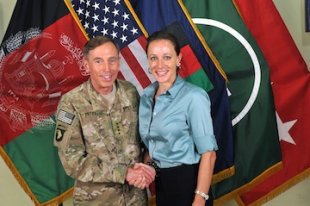BEIJING (AP) — During China’s last party congress, the cadres in charge of the world’s most populous nation didn’t know a hashtag from a hyperlink. But five years on, there’s a new message from Beijing: The political transition will be microblogged.
Party officials have this fall embraced social media with unprecedented enthusiasm, hoping it can help guide public opinion and stir up excitement about the staid and scripted party meeting taking place this week in Beijing that kicks off a transition to a new, younger set of top leaders.
Dozens of the more than 2,000 party delegates, among them Chairman Mao‘s grandson, are using social media to wax rhapsodic about China’s rise and Party General Secretary Hu Jintao’s live 90-minute reading of highlights from this year’s party work report. Typical posts include pictures of grinning delegates on Tiananmen Square and mobile snapshots of poinsettia arrangements and chandeliers from inside the Great Hall of the People, where the congress is meeting.
Guo Mingyi, a miner from the frigid northeast who was making his debut as a party delegate, tweeted: “On this land with great affections, how can I not sing, how can I not tear up, I love this piece of land, the people and the great Chinese Communist Party!”
State media also are posting microblog interviews with officials and shooting out updates about the congress schedule via Twitter-like accounts.
But apart from being a tool to deliver Beijing’s approved policy messages to the mobile phones of ordinary Chinese, the Internet is a two-way street that’s also being used by the public to poke fun at and critique the propaganda. Online commentators have compared the gushy crying and clapping of some delegates over Hu’s speech to North Korean style mass hysteria.
Responding to state media report about how a female delegate, Li Jian, cried five times at Hu’s work report, a Sina microblog user writing under the name ‘Buying Soysauce’ wrote: “I sobbed uncontrollably too, at the thought that these people were my compatriots.”
Wang Keqin, the assistant to the editor in chief of Beijing’s Economic Observer magazine, wrote about the tears of another delegate, He Guiqin: “It’s back to North Korea overnight!”
Other critics have dredged up old headlines from 1987 about the scourge of bribe-seeking and posted them online to highlight how little party rhetoric, and party problems, have changed despite major social change over the last three decades.
The clash of ideas underscores just how important the Internet has become in China’s campaign to guide public opinion — a major shift from just a few years ago.
At the last party conclave in October 2007, Twitter was a little over a year old and hashtags had only just been introduced. China’s leading homegrown Twitter-like microblog service, Sina Weibo, was still two years from launch.
But as elsewhere, China’s Internet population has exploded over the last five years, jumping from 170 million to more than 500 million today. Social media has boomed with it and now plays a huge part in everyday Chinese life, particularly for urban residents who use it to find restaurants, jobs and mates.
Beijing’s initial reaction to social media was to block and censor, to limit conversations by banning access to Twitter and Facebook and to limit mention of anything considered sensitive or destabilizing with keyword filters. Though authorities still use those tactics, the government is increasingly proactive and working to wrest control of the online conversation by flooding the zone with its own content.
David Bandurski, a researcher with the China Media Project at Hong Kong University, says Chinese officials have learned that simply banning or blocking reports is no longer effective in the porous Internet sphere and that stifling information can backfire by fanning more interest in scandals and crises and sparking online rumors.
“You can’t just stuff the genie back into the bottle,” said Bandurski. “You have also to channel public opinion … officially, they are seeing social media as the best way to send out their authoritative information and kind of drive the agenda.”
But the government remains yoked to its party-ese, which can seem hopelessly out of date in the Twitter age.
A dispatch on the trend by the official Xinhua News Agency gives a hint to the flavor of Beijing’s rhetoric.
“The Internet has been unprecedentedly embedded into the ongoing National Congress of the Communist Party of China,” the news agency trumpeted over the weekend. “Not only can contents on the Internet be found in the congress report, but online media practitioners are attending the congress in person.”
On Saturday, Chairman Mao’s grandson Mao Xinyu tweeted this to his 105,943 followers on Renmin Weibo, the microblog of the official party paper, the People’s Daily: “Mao Zedong thought will always be the guiding ideology of the party.”
It got 155 retweets, a mediocre showing in China‘s lively web sphere.
___
Follow Alexa Olesen on Twitter: http://twitter.com/alobeijing
Social Media News Headlines – Yahoo! News



